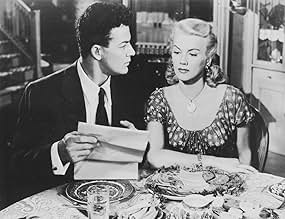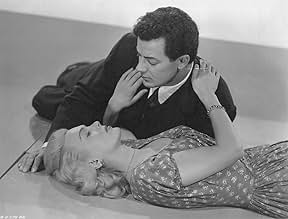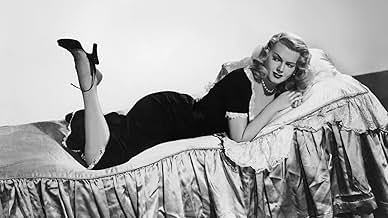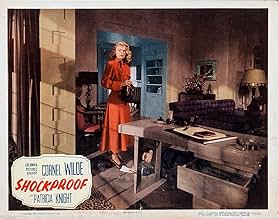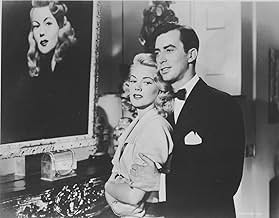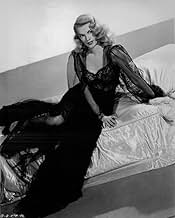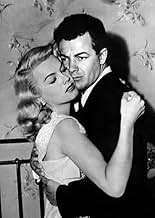IMDb RATING
6.5/10
2.8K
YOUR RATING
A parole officer falls in love with his client, a ravishing blonde who served time for murder, and he's determined to help her go straight despite her interfering criminal boyfriend.A parole officer falls in love with his client, a ravishing blonde who served time for murder, and he's determined to help her go straight despite her interfering criminal boyfriend.A parole officer falls in love with his client, a ravishing blonde who served time for murder, and he's determined to help her go straight despite her interfering criminal boyfriend.
Shirley Adams
- Emmy
- (uncredited)
Gilbert Barnett
- Barry
- (uncredited)
Richard Benedict
- 'Kid' - Knife Wielder
- (uncredited)
Paul Bradley
- Airline Clerk
- (uncredited)
Argentina Brunetti
- Stella
- (uncredited)
Paul Bryar
- Man in Car
- (uncredited)
John Butler
- Sam Green, Pawnbroker
- (uncredited)
Claire Carleton
- Florrie Kobiski
- (uncredited)
Cliff Clark
- Mac - Police Lieutenant
- (uncredited)
King Donovan
- Joe Wilson
- (uncredited)
Al Eben
- Joe Kobiski
- (uncredited)
- Director
- Writers
- All cast & crew
- Production, box office & more at IMDbPro
6.52.7K
1
2
3
4
5
6
7
8
9
10
Featured reviews
If You Can Lick Them, Join Them
If the movie were an airplane, then it wobbled a lot before finally crashing and burning with an utterly illogical ending. Up to that point, this crime drama is mediocre at best. The best part follows the couple (Wilde and Knight) as they flee the cops after running out on Knight's parole and in the process sinking into society's lower depths. That 20 minute sequence is done with both flair and zip.
Director Douglas Sirk is known for artistic soap opera, so it's not surprising that this film emphasizes the love story over the crime element. The trouble is that Wilde is woodenly uninvolving, while Knight's character remains muddled, to say the least. A key part of the plot lies in tracking her evolving emotions. But that's hard to do since these developments are confusingly portrayed, helped neither by the turgid script nor by Knight's thespic limitations. Apparently cult movie-maker Sam Fuller co-authored some of the screenplay, which, on the face of it, seems hard to believe. Nonetheless, I'm sure he had nothing to do with the ridiculous climax that instead smacks of outside interference of the most thoughtless kind.
Calling this a noir film is, I think, a stretch. It's certainly not filmed as noir, with none of the usual trademark light and shadow. True, the plot contains a number of noirish elements, but Sirk's style doesn't bring these out in recognizably noir fashion. Even so, the many SoCal location shots are both entertaining and appropriate for crime drama. (Too bad we don't get more of the dingy oil field setting, which has definite and exotic noir potential.) But noir or not, this is a rather poorly done crime drama, having neither the force nor the panache of the better examples of the period. With better casting, a more cogent screenplay, and more attention to the oil field, this could have been a memorable film.
Director Douglas Sirk is known for artistic soap opera, so it's not surprising that this film emphasizes the love story over the crime element. The trouble is that Wilde is woodenly uninvolving, while Knight's character remains muddled, to say the least. A key part of the plot lies in tracking her evolving emotions. But that's hard to do since these developments are confusingly portrayed, helped neither by the turgid script nor by Knight's thespic limitations. Apparently cult movie-maker Sam Fuller co-authored some of the screenplay, which, on the face of it, seems hard to believe. Nonetheless, I'm sure he had nothing to do with the ridiculous climax that instead smacks of outside interference of the most thoughtless kind.
Calling this a noir film is, I think, a stretch. It's certainly not filmed as noir, with none of the usual trademark light and shadow. True, the plot contains a number of noirish elements, but Sirk's style doesn't bring these out in recognizably noir fashion. Even so, the many SoCal location shots are both entertaining and appropriate for crime drama. (Too bad we don't get more of the dingy oil field setting, which has definite and exotic noir potential.) But noir or not, this is a rather poorly done crime drama, having neither the force nor the panache of the better examples of the period. With better casting, a more cogent screenplay, and more attention to the oil field, this could have been a memorable film.
A bit canned and choppy, but Wilde's performance is sharp and the filming fine
Shockproof (1949)
Sam Fuller, the writer of this film, is admired for breaking rules and being a little bit edgy. Douglas Sirk, the director, is known for sumptuous, no compromise melodramas with gorgeous dreamy sets and an arch and affecting artificiality. They make an odd mix, and something doesn't quite click here.
The plot is standard fare but good--a parole officer falls for a reluctant parole, who still has a thing for a thug up to no good. The officer is terrific, Cornell Wilde at his regular guy best, a kind of echo of Dana Andrews with a little more warmth. But the main woman, Patricia Wright, is a bit wooden. You can feel her trying too hard too often, and it's just one of those things that cuts the rest of the effort down to size. Not surprisingly, she was only in five feature films, and was the lead in only one other.
But setting aside her presence and its deadening effect, there are some things to really enjoy here. You might find the movie ordinary for awhile, with some nice clichés and a steady development. But then, halfway, there's a huge and really sudden twist. And a believable one, a great scene. Suddenly there is a whole new plot. We aren't quite involved enough with the two leads to get swept away in their love affair (as we certainly do in "Gun Crazy" two years later, or in "They Live by Night" the same year), but it's exciting anyway. There are some scenes at an oil rig and the worker's cabins (I assume it's a set) that are gorgeous.
And then there's a sixty second surprise ending that doesn't do the movie justice and is very unlike Fuller. It's almost like someone took the script from Fuller and said, no Sam, that won't do. And rewrote it. And in fact that's what happened. One of the Columbia producers, Helen Deutsch, stepped in to remove Fuller's violent first intention. In fact, that final scene wasn't even directed by Sirk, who quit Columbia and left the country in anger (only to return and start a string of his famous 1950s masterpieces). A detailed account of all this is at www.tcm.com/this-month/article/208688%7C0/Shockproof.html.
What else? The photography by Charles Lawton Jr. is great (he had just done Welles's vigorous "Lady from Shanghai"), and a lot of the side actors are really good, especially the gambler boyfriend played by John Baragrey. This is one of those films to enjoy in pieces, or to enjoy for how it fits into the chronologies of some of the people who made it. Wilde and Knight, by the way, were still married during the filming (Wilde insisted Knight get the part) but they split up in 1951.
Sam Fuller, the writer of this film, is admired for breaking rules and being a little bit edgy. Douglas Sirk, the director, is known for sumptuous, no compromise melodramas with gorgeous dreamy sets and an arch and affecting artificiality. They make an odd mix, and something doesn't quite click here.
The plot is standard fare but good--a parole officer falls for a reluctant parole, who still has a thing for a thug up to no good. The officer is terrific, Cornell Wilde at his regular guy best, a kind of echo of Dana Andrews with a little more warmth. But the main woman, Patricia Wright, is a bit wooden. You can feel her trying too hard too often, and it's just one of those things that cuts the rest of the effort down to size. Not surprisingly, she was only in five feature films, and was the lead in only one other.
But setting aside her presence and its deadening effect, there are some things to really enjoy here. You might find the movie ordinary for awhile, with some nice clichés and a steady development. But then, halfway, there's a huge and really sudden twist. And a believable one, a great scene. Suddenly there is a whole new plot. We aren't quite involved enough with the two leads to get swept away in their love affair (as we certainly do in "Gun Crazy" two years later, or in "They Live by Night" the same year), but it's exciting anyway. There are some scenes at an oil rig and the worker's cabins (I assume it's a set) that are gorgeous.
And then there's a sixty second surprise ending that doesn't do the movie justice and is very unlike Fuller. It's almost like someone took the script from Fuller and said, no Sam, that won't do. And rewrote it. And in fact that's what happened. One of the Columbia producers, Helen Deutsch, stepped in to remove Fuller's violent first intention. In fact, that final scene wasn't even directed by Sirk, who quit Columbia and left the country in anger (only to return and start a string of his famous 1950s masterpieces). A detailed account of all this is at www.tcm.com/this-month/article/208688%7C0/Shockproof.html.
What else? The photography by Charles Lawton Jr. is great (he had just done Welles's vigorous "Lady from Shanghai"), and a lot of the side actors are really good, especially the gambler boyfriend played by John Baragrey. This is one of those films to enjoy in pieces, or to enjoy for how it fits into the chronologies of some of the people who made it. Wilde and Knight, by the way, were still married during the filming (Wilde insisted Knight get the part) but they split up in 1951.
Corrosion Sets In
Patricia Knight has just been paroled. Her parole officer is Cornell Wilde. He reads off the list of restrictions which she has already memorized. She almost immediately breaks them when she sees her former lover, gambler John Baragrey in a bookie shop, but Wilde gives her another chance. She loses her job, so her takes her into his home to take care of his blind mother. Soon they are in love. She goes to Baragrey's apartment to tell him goodbye. He calls Wilde at the office to tell him she's breaking parole and playing him for a sucker, so she shoots him. And she and Wilde go on the run.
Douglas Sirk directs with lots of fine location shooting, including the essential-for-noir Bradbury Building. He agreed to shoot this one after reading Samuel Fuller's original story, even though Columbia put in a cop-out ending that frustrated Wilde's character arc, from a straight-arrow fellow with political ambition to a criminal on the run. His real-life wife, Patricia Knight, gives a fine, guarded performance; you never know what she's really thinking or going to do next. Her movie career did not survive her divorce from Wilde. She died in 2004, age 89.
Douglas Sirk directs with lots of fine location shooting, including the essential-for-noir Bradbury Building. He agreed to shoot this one after reading Samuel Fuller's original story, even though Columbia put in a cop-out ending that frustrated Wilde's character arc, from a straight-arrow fellow with political ambition to a criminal on the run. His real-life wife, Patricia Knight, gives a fine, guarded performance; you never know what she's really thinking or going to do next. Her movie career did not survive her divorce from Wilde. She died in 2004, age 89.
"Stop with the melodrama!" touché
They say it's the journey, not the destination, that usually counts with stories. In the case of Shockproof it's good to just focus on the journey, in all its B-movie-ness and, yes since it is Douglas Sirk, melodrama, because the destination kind of stinks. The film's story concerns a beautiful blonde parolee played by Patricia Knight who is put into the watchful eye and soon enough loving arms of her parole officer, Cornell Wilde. She's been wanting to get back together with her former lover, a gambler-hustler named Harry Wesson, who by the look of the guy is sleazy but perhaps not too bad a shake for a 'dame' like Knight plays. But the parole officer wants a better life for her, and that she knows it too. Soon she does, after some persistence, fall for Griff, but at a price when another character gets (preumably) murdered after a gunshot.
It becomes a lovers-on-the-run story, and, not to quote Harry's own line about the melodrama I mention above, this twist does bring some melodrama with it as the characters try to evade the law, cross into Mexico, go back into the states and Griff becomes an oil-drill worker. But the main problem of being on the lam catches up to them, and finally a decision is made. It's around here, in just the last few minutes, that the film really crumbles into predictability (and, to be fair, it wasn't Fuller's idea as the producer rewrote the script before filming). The acting and the script up until that point, however, does deliver on the promise of a simple premise. There's nothing terribly special about the story, but it works on its own terms as a tale of a love-triangle gone awry. We know the situation might be different if a character did something smarter, or did something more drastic or if, say, Harry went more into an actual criminal role and just ran off with Jenny to start with after she got out of prison.
But as it stands the performances are just fine- even the one-note crooning of the blind mother of Griff's who knows what she knows even without seeing, a real Fuller caricature if I ever saw one- and when it comes off like a real film-noir, with edge and believability, both of the legends Sirk and Fuller can get credit. It's no great shakes, but it passes 80 minutes by with some rich emotions and a, with a few exceptions in some scenes, solid dramatic turns and directions made by the characters.
It becomes a lovers-on-the-run story, and, not to quote Harry's own line about the melodrama I mention above, this twist does bring some melodrama with it as the characters try to evade the law, cross into Mexico, go back into the states and Griff becomes an oil-drill worker. But the main problem of being on the lam catches up to them, and finally a decision is made. It's around here, in just the last few minutes, that the film really crumbles into predictability (and, to be fair, it wasn't Fuller's idea as the producer rewrote the script before filming). The acting and the script up until that point, however, does deliver on the promise of a simple premise. There's nothing terribly special about the story, but it works on its own terms as a tale of a love-triangle gone awry. We know the situation might be different if a character did something smarter, or did something more drastic or if, say, Harry went more into an actual criminal role and just ran off with Jenny to start with after she got out of prison.
But as it stands the performances are just fine- even the one-note crooning of the blind mother of Griff's who knows what she knows even without seeing, a real Fuller caricature if I ever saw one- and when it comes off like a real film-noir, with edge and believability, both of the legends Sirk and Fuller can get credit. It's no great shakes, but it passes 80 minutes by with some rich emotions and a, with a few exceptions in some scenes, solid dramatic turns and directions made by the characters.
Make it a 6.5!
The title is ponderous - There are no "shocks" in this film or anything that would need you to be resistant to them. Just a catchy irrelevant title I guess.
Griff Marat ( Cornell Wilde) is a straight arrow of a parole officer with political ambitions. His latest charge is a woman, Jenny Marsh (Patricia Knight) who has just left prison after five years. Griff gets her a room and a job, but most importantly tells her she cannot see her old friends anymore, in particular, Harry Weeson, the man she killed for. But she is very beholden to Harry because he has waited these five years for her. Griff says that if he has waited that long he can wait awhile longer.
So you have young handsome single Griff, from an ethnic background that marries young, that can't afford any scandal if he wants to go up in the world. You have confused but beautiful Jenny who feels obliged to somebody she did time for. Shouldn't it be the other way around? And Weeson is hard to figure out. He's more of a professional gambler than a mobster, doesn't appear to be cheating on Jenny, and I never could figure out exactly what he wanted from her.
The killing Jenny did is never explained. If she was defending Weeson's life, why was it a crime? If it was her just killing somebody who was a nuisance to him, why is she out in only five years? Actress Patricia Knight is believable in this role, and although she is Wilde's wife at the time, she also looks much like Douglas Sirk favorite, Dorothy Malone, minus Malone's electricity. The reason I bring that up is Sirk directed this film.
The first 60% of the film really has no surprises. It took one of several paths I saw it taking from the start. But then the last third is really out in left field with Griff abandoning everything I thought that made him tick and with him showing himself to be much more wily than I thought him capable.
There is one really shocking scene when one parolee is told he is going back to prison. He begs to differ in a big way. It's definitely a Fuller touch - Sam Fuller wrote the script. But as for that ending, somebody must have locked Fuller in a broom closet and rewrote whatever ending he proposed. I'd recommend this one just because it is so very odd.
Griff Marat ( Cornell Wilde) is a straight arrow of a parole officer with political ambitions. His latest charge is a woman, Jenny Marsh (Patricia Knight) who has just left prison after five years. Griff gets her a room and a job, but most importantly tells her she cannot see her old friends anymore, in particular, Harry Weeson, the man she killed for. But she is very beholden to Harry because he has waited these five years for her. Griff says that if he has waited that long he can wait awhile longer.
So you have young handsome single Griff, from an ethnic background that marries young, that can't afford any scandal if he wants to go up in the world. You have confused but beautiful Jenny who feels obliged to somebody she did time for. Shouldn't it be the other way around? And Weeson is hard to figure out. He's more of a professional gambler than a mobster, doesn't appear to be cheating on Jenny, and I never could figure out exactly what he wanted from her.
The killing Jenny did is never explained. If she was defending Weeson's life, why was it a crime? If it was her just killing somebody who was a nuisance to him, why is she out in only five years? Actress Patricia Knight is believable in this role, and although she is Wilde's wife at the time, she also looks much like Douglas Sirk favorite, Dorothy Malone, minus Malone's electricity. The reason I bring that up is Sirk directed this film.
The first 60% of the film really has no surprises. It took one of several paths I saw it taking from the start. But then the last third is really out in left field with Griff abandoning everything I thought that made him tick and with him showing himself to be much more wily than I thought him capable.
There is one really shocking scene when one parolee is told he is going back to prison. He begs to differ in a big way. It's definitely a Fuller touch - Sam Fuller wrote the script. But as for that ending, somebody must have locked Fuller in a broom closet and rewrote whatever ending he proposed. I'd recommend this one just because it is so very odd.
Did you know
- TriviaThis film features the iconic Bradbury Building at 304 S. Broadway as the location of Griff Marat's office. Out of his office window can be seen the old Hall of Records Building at 220 N. Broadway (demolished 1973), which is about 0.4 miles away.
- GoofsWhen Sam Brooks comes into Griff's office, he leaves the door open. After he reads the folder and leaves the door is closed without him ever closing it.
- Quotes
Jenny Marsh: I'm no longer asking you to say goodbye. I'm just saying it!
- Crazy creditsFollowing the opening credits the camera pans onto the curb edge of the road which reads HOLLYWOOD BLVD.
- ConnectionsFeatured in Behind the Mirror: A Profile of Douglas Sirk (1979)
- How long is Shockproof?Powered by Alexa
Details
- Runtime
- 1h 19m(79 min)
- Color
- Aspect ratio
- 1.37 : 1
Contribute to this page
Suggest an edit or add missing content

